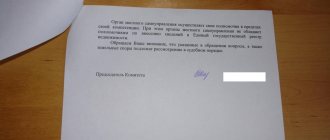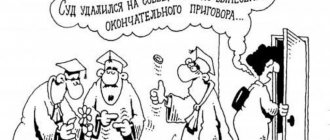Everything about criminal cases
Mystery room
— violation of the secrecy of the deliberation room is directly mentioned by the Supreme Court among the violations “distorting the essence of justice” (clause of the Plenum No. 2). That is, this is a “strong” violation.
Unconditionality
- in cassation, unlike in appeal, “obvious” and “unconditional” reasons for cancellation are not so strictly indicated. The appeal norm, part 2 389.17, contains a list of obvious grounds for cancellation; the cassation norm (part 2 and part 3 401.15 of the Code of Criminal Procedure) has 2 purely “technical” grounds, but there is no such direct list as for an appeal;
— those violations that work on appeal may not work on cassation: because:
a) for an appeal: procedural violations “that influenced or could have influenced the outcome of the case” are sufficient, that is, even the alleged influence on the outcome of the case is subject to assessment (Part 1 389.17);
b) for cassation: only those “that influenced the outcome of the case” are needed (part 1 401.15);
Primary arguments
- these are those violations that you assess as the most “strong”, most obvious and closest to “significant”;
— their role: to break through the “barrier” of primary examination, to convince the judge to transfer the case for consideration.
Beginning of the complaint
- in a cassation appeal, the strongest argument should go in the first “line”;
— task: to interest the judge conducting the initial “study” of the complaint. If we start our presentation with secondary “weak” arguments, then we waste the judge’s attention resource;
- if, for example, in lower courts in debates, it is quite appropriate to build a tactic of “warming up, then we present the strongest arguments”, then in a cassation appeal I would not do this (personal opinion, but I am completely convinced of it, the cassation appeal is not at all tolerates excesses and “prettiness”).
Secondary Arguments
- in addition to the primary arguments, you have others that you do not rate as “strong”. During the time that has passed before the cassation stage, you have accumulated a “baggage” of identified (or contrived) violations committed in the first instance and appeal. All these “clues” are asked to be used; it is almost impossible to refuse to use them for psychological reasons: “what if this particular argument works,” “I can’t remain silent about violations.”
— what to do with them? Usually, applicants do not even ask such a question, and without any hesitation “stuff” the cassation appeal with a mass of arguments, any that seem at least somewhat significant to them.
Why is this the wrong tactic?
- You bury correct arguments in a mass of erroneous ones. The complaint, set out on 10 pages, containing a lot of references to constitutional norms, incoherent lamentations and pleas, simply drowns out those arguments that could “work.” Judges are ordinary people who do not have super insight, and they are not at all happy to separate the “wheat from the chaff”;
- such complaints already contain the most convenient “clues” for refusal, making it easier for the judge to argue, that is, you give easy arguments against yourself;
- in the court decision on refusal, the court will cite your most grossly erroneous demands, and when you appeal the refusal of the complaint at the next stage of the process, then for the judge, again studying the documents in your case, the previous refusal will look well reasoned.
What to do
— limit yourself, highlight only those violations that have at least approximate signs of being “significant”;
— minor violations do not increase the “strength” of the cassation appeal; on the contrary, they waste the judge’s attention and distract him from the real arguments.
Nothing is lost
- if the complaint can overcome the “barrier” of primary study (this will be easier without the burden of small arguments hanging on it), then you do not lose the opportunity to refer to other violations;
— firstly: you can supplement the complaint with new arguments by sending additions “to follow” the main complaint (see more details here);
- secondly: secondary arguments can be presented directly at the court hearing of the cassation court (see more details here).
Changes in the review of cases in the supervisory order
On July 21, 2018, the main provisions of the Law of January 8, 2018 N 94-Z “On Amendments and Additions to the Civil Procedure Code of the Republic of Belarus” came into force. The amendments concern the procedure for appealing court decisions of district, city and regional courts.
The main innovation is the institution of appeal against court decisions, which replaced cassation. However, significant changes also affected the procedure for reviewing civil cases by way of supervision. Let's take a closer look at the innovations.
1. The grounds for filing a protest in the manner of supervision have been clarified
| It was <*> | It became <*> |
| The basis for filing a protest in the manner of supervision is significant violations of the norms of substantive and (or) procedural law | The basis for filing a protest in the manner of supervision is significant violations of substantive and (or) procedural law, which led to the issuance of an illegal court decision |
Comment: this approach means that a court decision that is essentially correct cannot be overturned if there are only formal violations. The norm is not new. Previously, it was enshrined in paragraphs 3 - 5 of the resolution of the Plenum of the Supreme Court of June 26, 2003 N 7 “On the practice of considering civil cases through judicial supervision,” which explained what should be understood as significant violations of substantive and procedural law.
2. The period for filing a complaint under supervision has been reduced
| It was <*> | It became <*> |
| A supervisory appeal could be filed within three years from the date the court decision entered into legal force | A supervisory appeal can be filed within a year from the date of entry into force of the court decision |
Comment: such a change primarily means a gradual convergence of the rules of civil and economic proceedings in the context of the development of a unified procedural code. In addition, reducing the time limit for filing a supervisory complaint will increase the level of legal certainty.
3. The grounds for returning the complaint in the manner of supervision are established
| It was <*> | It became <*> |
| The supervisory complaint was returned without consideration if: 1) was filed after missing the deadline for appealing a court decision in the manner of supervision; 2) was not paid with state duty; 3) was submitted in violation of the procedure established by Part 5 of Art. 438 Civil Procedure Code; 4) did not meet the requirements of parts 1 - 4, 6 - 7 of Art. 438 Civil Procedure Code | The supervisory complaint is returned without consideration if: 1) is submitted in violation of the requirements provided for in Article 437 of the Code of Civil Procedure; 2) the deadline for appealing a court decision in the manner of supervision has been missed; 3) the court decision was not appealed, and the reasons for not filing an appeal are disrespectful; 4) the complaint is withdrawn before its consideration; 5) is submitted again to the same official and does not contain new arguments about the illegality of the court decision |
Comment: the opportunity to return a complaint by way of supervision existed before, although there was no direct provision in the Code of Civil Procedure. The new edition of the Code of Civil Procedure has clarified the list of grounds for returning a complaint.
4. The deadline for consideration of a complaint in the supervisory procedure by an official who has the right to lodge a protest in the supervisory procedure
| It was <*> | It became <*> |
| A supervisory appeal against court decisions was considered no later than a month from the date of receipt, and in the case of a claim - no later than a month from the date of receipt of the case | A supervisory appeal against a court decision should be considered no later than a month from the date of receipt, and in the case of a claim, no later than a month from the date of its receipt. The period for consideration of a supervisory complaint that requires additional study and verification may be extended by no more than two months. The same applies to a complaint in a case of particular complexity |
Comment: taking into account the changes, a complaint under the supervision procedure can be considered for a total of about three to four months. In this case, the deadline for receiving the requested case is taken into account.
5. The deadline for submitting explanations to the court on a supervisory complaint
| It was <*> | It became <*> |
| Notices of the time and place of the consideration of the case and copies of the protest in the manner of supervision must be sent to persons legally interested in the outcome of the case in such a way that they have the opportunity to submit to the court written explanations for the protest with supporting documents by the time of consideration | Copies of the protest in the order of supervision and notification of the time and place of consideration of the case must be sent to persons legally interested in the outcome of the case in such a way that they have the opportunity, before the start of the consideration of the case, to submit written explanations for the protest with supporting documents to the court |
Comment: the new edition of the norm requires that explanations be submitted to the court in such a way that the persons participating in the case can familiarize themselves with them and prepare their position. The change reflects the general trend towards increasing discipline and integrity of the parties, disclosure of evidence before the start of the case.
6. The scope of consideration of the case by the supervisory court has been narrowed
| It was <*> | It became <*> |
| When considering a case, the court checks the legality and validity of the court decision both in the protested and unprotested parts, as well as in relation to persons not specified in the protest. The court is not bound by the arguments of the protest and is obliged to check the case in full | The court checks the legality and validity of the court decision in the contested part. If the inspection reveals significant violations of substantive and (or) procedural law, the supervisory court has the right to verify the resolution in full |
Comment: the narrowing of the scope of consideration of the case reflects the general trend towards increasing the level of discretion in the process. A similar change occurred in the procedure for considering complaints against decisions of the court of first instance.
7. The terms of consideration of the case in the supervisory court have been changed
| It was <*> | It became <*> |
| The supervisory court considers the case no later than 20 days, the Supreme Court - no later than 1 month, and the Plenum of the Supreme Court - no later than 3 months from the date of receipt of the case with protest | The supervisory court considers the case no later than 1 month, the Plenum of the Supreme Court - no later than 3 months from the date of receipt of the case with protest |
Comment: the minimum period for consideration of a case in a supervisory court has been increased. Now in the presidiums of the regional and Minsk city courts, cases by way of supervision will be considered within up to 1 month.
Who has the right to file a supervisory appeal to the Supreme Court?
Persons who have the right to file such a complaint in specific circumstances are determined by Article 412.1 of the Code of Criminal Procedure of the Russian Federation. These include:
- Participants in the trial: the victim, the convicted and the acquitted.
- Other persons whose interests were infringed by a court decision.
- Representatives of citizens who cannot independently participate in court proceedings (due to illness, disability or being in closed correctional institutions). Since such persons themselves cannot appear at the court hearing, they have the right to issue a power of attorney in the name of their representative.
Citizens whose interests were not considered in the judicial process of lower authorities cannot file a supervisory complaint with the Supreme Court of the Russian Federation.
Time limits for consideration of supervisory complaints
Supervisory complaints in the Supreme Court are not always considered within a month. There are the following nuances for considering submitted applications:
- A period of 1 month is established for the consideration of complaints, the analysis of which does not require requesting case materials from a lower court.
- If such a request is submitted, the case is considered within 2 months from the date of registration of the complaint in the office of the Supreme Court. Please note that the time for making a request and receiving a response to it is not included in this period.
In practice, consideration of a complaint, taking into account the time required to request documents, often lasts up to 3 months.
Based on its results, the Supreme Court makes a decision, which immediately comes into force.
Rules for filing a supervisory complaint
Trials in administrative, civil or criminal cases must be based on an analysis of all evidence collected by the investigator and the defense. However, the decision made does not always satisfy the parties to the case and is seen by them as fair. It is especially important to make the right decision in a criminal case, since this procedure of investigation concerns serious crimes against the health and safety of people.
In case of disagreement with the decision of the court of first instance (city or district), the participants in the case have the right to appeal its verdict within the framework of appeal and cassation. If these methods of appeal do not produce the desired results, the last remaining way to overturn the court decision is to file a supervisory appeal with the Supreme Court of the Russian Federation.
An important feature of such a complaint is that there are no time limits for filing it. It is possible to cancel a court decision even after it has entered into force.






